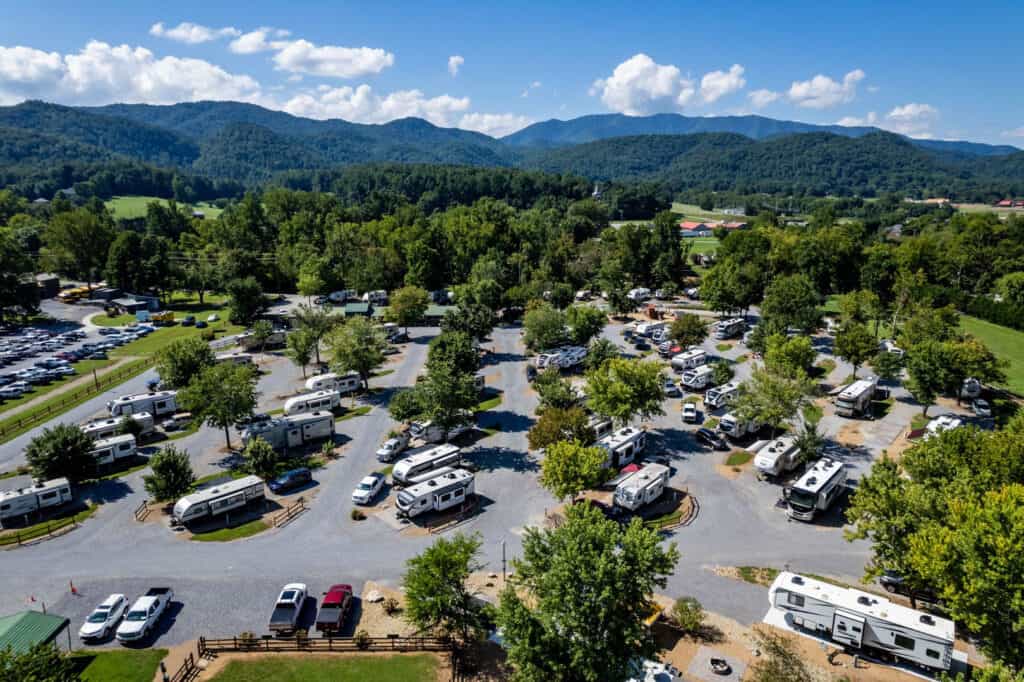
If you’re camping in an RV, the campground’s Wi-Fi is probably not the only reason Wi-fi can be slow. RVs are made of metal, and metals, like aluminum and steel, are bad for long-range Wi-Fi. Furthermore, the fiberglass, furniture, and kitchen appliances in your RV can also contribute to bad reception. Basically, RVs shield you from the outside elements (which is good, you want to be safe from rain and bears!), but they also shield you from Wi-Fi signals. Remember Internet connectivity is a two-way communication. The park has several powered antennas/repeaters sending out their signal. Your phone or laptop has a tiny one trying to complete that connection.
Streaming video takes up a lot of bandwidth, so if even just one or two other people are trying to stream video using Wi-Fi, they can render it unusable for those around them. We advise against streaming videos for this reason, but some people choose to bypass this advice. That is also why many campgrounds charge for Wi-Fi instead of offering free wi-fi like we do at Big Meadow Family Campground. HINT – remember we have cable available at each site for your viewing pleasure.
If the campground is crowded and many people are trying to use the Wi-Fi at once, the service will be slow. There’s nothing you can do to improve this situation, and it’s just the reality of staying in a mountainous area. The technology simply cannot support the number of people trying to use it. The only other option is to ask your camping neighbor to stop streaming and that will cause problems for you!
Assuming you prefer to stick to using the campground’s Free Wi-Fi, you have a few different options. Try these solutions to your campground internet problems next time you are out and about. They might make a big difference to keep you happy!
The first and easiest thing you can do is to simply stick to the tasks that don’t require a fast connection. Often, our family will download movies/show episodes before a trip to remove the need to stream anything later. Social media and email should work even with a very bad connection, so if you don’t need to attend video meetings, you might be able to get away with a poor connection while you camp.
If you need the internet to be a bit faster, but don’t want to invest in an RV internet setup, consider heading to the campground office while here. We have hotspots located all around the porch area. That is why we have so many tables sitting around this location.
Wi-Fi Adaptor
To solve your Wi-Fi problem you can try purchasing a USB Wi-Fi adapter, like the Blue Shadow USB WiFi Adapter on Amazon.com. We like this adapter because it is extremely fast, and it’s strong enough to stream HD video. This adapter also has a rotating antenna to move the antenna and improve signal and performance, which is essential for staying in campgrounds.
Get a Repeater
There is also the option of improving the connection in your camper by putting up a repeater (also known as a ranger or extender). The repeater works by pulling the Wi-Fi connection into your RV and repeating or amplifying it. Many customers find this makes an enormous difference and makes the campground Wi-Fi much more usable when they have a wi-fi connection on their tablet or computer when sitting outside the coach, and not having it when inside, this is most likely a wifi signal strength problem and can often be fixed with a simple $25-$35 wifi repeater located somewhere inside the coach where it can see out the side windows or the front windshield. Something like https://www.amazon.com/TP-Link-Intel…dp/B07CRR32TV/ Sure the roof mounted wi-fi extenders will work better, but they also cost a lot more than $35, and much of the time one of these simple extenders will work almost as well.
Get a Mobile Hotspot
The first thing you’ll needin order to have internet in your RV no matter where you travel is a cellular connection through a hotspot. We recommend using a cell carrier that offers decent coverage all across the country. The most popular options with RVers around this area are Verizon, US Cellular and AT&T.
Cell Phone Carrier
Unfortunately, no carrier has good coverage absolutely everywhere, especially when it comes to mountainous areas. For this reason, if you need to make sure your connection works everywhere you go, we recommend investing in two or three plans with different carriers so you can switch to the connection that works best wherever you happen to be.
Booster
You can also try a cell booster. These boosters work by amplifying existing cell service, making for a faster connection. Obviously, this is helpful when you need a decent connection but can only seem to bring in 1 extra bar of signal with the hotspot.
Starlink
You can also give satellite internet through Starlink a try. Starlink is fast, becoming more portable and will soon be one of the easiest ways to have reliable internet even in the most mountainous locations.
We hope these RV Park Wi-Fi solution examples will help you be able to connect to the internet in your RV no matter where you go. Why not start working on your RV internet setup right away so you can stay connected on your next big RV adventure?
